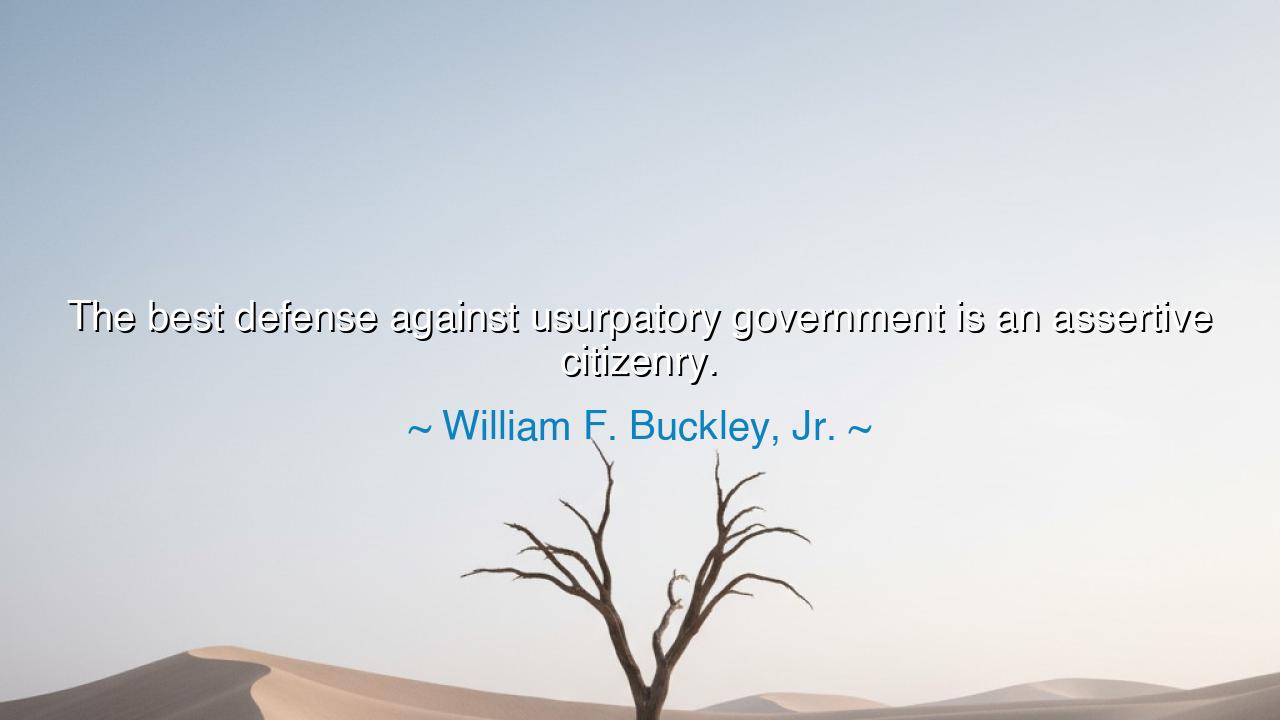
The best defense against usurpatory government is an assertive






"The best defense against usurpatory government is an assertive citizenry." – William F. Buckley, Jr.
In this resolute declaration, William F. Buckley, Jr., the sharp-minded conservative thinker and defender of individual liberty, reminds the generations that freedom is not a gift kept safe by parchment or decree—it is a living covenant between the governed and those who govern. His words, elegant and severe, carry the eternal warning that tyranny does not rise overnight; it advances quietly, through apathy and fear, through the silence of the people and the swelling ambition of power. The only safeguard, he insists, is not law alone, but the spirit of vigilance—an active, courageous citizenry willing to challenge authority when it strays from its rightful bounds.
The origin of this quote lies in Buckley’s lifelong crusade against complacency and authoritarian drift. As the founder of National Review and one of the most eloquent defenders of constitutional order, Buckley stood at the crossroads of intellect and activism during the Cold War. He saw how both communism abroad and bureaucracy at home threatened the moral fiber of the free world. “Usurpatory government,” in his words, refers to a state that quietly usurps—that is, steals—the powers and freedoms reserved to the people. It is not always through open tyranny that liberty dies, but through the slow suffocation of centralized control. His answer was simple, yet profound: only a citizenry that refuses submission can preserve the Republic.
The truth of Buckley’s warning is written throughout history. Consider the rise of the Roman Empire, once a republic proud of its Senate, its civic virtue, and its laws. Over centuries, the citizens grew weary of responsibility. They longed for ease and security more than freedom. They entrusted too much to their leaders, and those leaders—beginning with Caesar—transformed guardianship into dominion. Rome did not fall because its legions were weak, but because its citizens ceased to be assertive. They traded the liberty of participation for the comfort of servitude. Buckley’s words echo across millennia to remind us that every generation faces the same temptation—and that freedom dies not with a roar, but with a shrug.
To be assertive, in Buckley’s sense, is not to be rebellious for rebellion’s sake. It is to stand upright before power, to question, to challenge, to hold leaders accountable not with violence, but with courage and intellect. A free people must not only vote; they must understand. They must not only protest; they must think. The true citizen does not wait for permission to act—he acts because he knows that self-government demands self-respect. The timid will always find reasons to stay silent; the assertive know that silence, when truth is in peril, is itself a crime.
One need only look to the example of Lech Wałęsa and the Solidarity movement in Poland to see the power of assertive citizenship. Under Soviet domination, the Polish people were told that resistance was futile, that obedience was safety. Yet workers, intellectuals, and mothers alike rose together in defiance. They demanded truth, they demanded dignity, and though the regime imprisoned them, they could not imprison their will. That movement, begun in shipyards and whispered in churches, broke the chains of tyranny—not through armies, but through the courage of citizens who refused to be ruled without consent.
Buckley’s message, therefore, is both a call and a warning. It calls upon us to reclaim the noble identity of the citizen, not the passive consumer of politics or the fearful subject of authority. It warns that every right we neglect to defend will be taken, every liberty we fail to exercise will decay. A government that overreaches is not an alien force—it is the reflection of a people who have forgotten their own power. The assertive citizenry is not a mob, but a conscience. It keeps rulers humble, laws just, and freedom alive.
The lesson, then, is this: liberty is not inherited—it is practiced. Constitutions are parchment; their power lies in the people’s will to uphold them. To be free, you must act free: ask questions, demand transparency, engage in civic life, and never surrender your moral independence to any party or power.
And so, the practical actions are clear: read deeply, think critically, and speak boldly. Vote not only at the ballot box, but in daily life—by defending truth in your conversations, by refusing to yield your conscience for comfort. Watch those in authority, not with cynicism, but with conviction. For as William F. Buckley, Jr. so rightly declared, the best defense against usurpatory government—against the slow theft of liberty—is not wealth, nor weapons, nor even words upon a page, but an assertive citizenry, awake, unafraid, and unyielding before the face of power.






AAdministratorAdministrator
Welcome, honored guests. Please leave a comment, we will respond soon